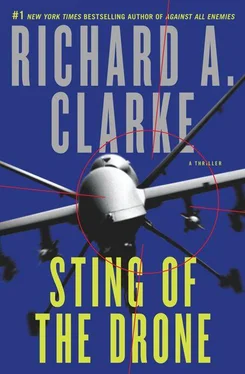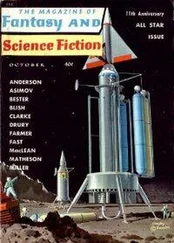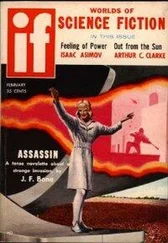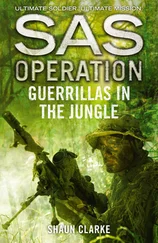“What are the chances they’ll find him?” Erik asked.
“Not real good. NSA says that phone went off the grid after that call,” the voice from Virginia replied.
Erik Parsons could see Sandra Vittonelli entering her office, separated from the Operations Room floor by a glass wall. His boss showed up at all times, day and night. He never knew when she would appear, but he knew her drop-ins would be frequent. He walked off the floor to brief her.
“Hey, what’s up?” she said, apparently in a chipper, happy mood.
“I think you may want to give your friend in Washington a call so he hears it first from you,” Erik began.
“Shit, what’s wrong?”
“We just killed a guy who was talking to another guy about what your home office boys think is a plot to do a major terrorist attack on Americans around Christmas,” Erik explained.
“Well, fuck, why did you kill him? We should have milked that source for more details,” she said, sitting down behind her desk.
“We only killed the guy at one end of the call,” Erik answered. “The guy who was being told about it, not the guy that knew about it. But we should have held off. We figured it out too late.”
They sat looking at each other. Then she asked, “Where, how, who?”
“No idea.”
“Great,” she said.
“Just when.”
“’Round Christmas?” she asked.
Erik nodded his head.
“Just enough to get the big boys agitated, but not enough to do anything with it. Lovely.”
SATURDAY, AUGUST 29
TSENTRALNI TORGOVI LAZNI
KIEV, UKRAINE
Ghazi Faqir Nawarz did not like being naked with other men. And even though they all had big, thick towels wrapped around them, the men in the steam room were naked, as were the men in the pools and the spa and the locker room. It made him uncomfortable, but that’s what the men from the Merezha cartel had told him to do. Take the Turkish Airlines flight from Istanbul to Kiev, check in at the Hotel Slavutych, and then go to the baths in the park across the street. They would contact him within two hours. But they hadn’t and he was done sitting in the steam room waiting.
He got up, tightened the towel around himself, and walked back to the locker room. He would dress quickly and shower back at the hotel. Then, suddenly, there was a bag over his head and hands grabbing at his towel. He went to swing, but his arms were pinned and then forced into something. They were putting a robe on him. Then in English, “Don’t worry. We are not the Americans. Just walk with us. We aren’t going to hurt you. We are taking you to the meeting.”
He was aware that they had left the building, then that they were in a truck, and that, after what seemed like at least half an hour, he was escorted out of the truck and, suddenly, the bag was lifted quickly off of his head. As his eyes adjusted to the light, he saw that he was standing in a large garage or warehouse with bright overhead lamps forty feet above, shining down on the concrete floor. Two white trucks were behind him, one with the back door still open.
“Please accept our apologies, Mr. Nawarz,” the slight, youngish man began. Dressed in blue jeans and a polo shirt, wearing glasses and a scruffy beard, he looked like a graduate student. The two men behind Ghazi were much bigger and in suits. “I hope my colleagues were not too unpleasant. We had to be sure that you were not followed and that you were not bugged. I’m sure you understand these things. Please, we have a changing room for you. And we have some of your clothes from the Slavutych. When you are ready, Dmitri Bayurak will see you.”
Dmitri Bayurak looked like an older version of the man who greeted Ghazi. Older, heavier, with thinner hair, he wore a blue blazer with his jeans and polo shirt. His office, up a stairway from the warehouse floor, was decorated in a Scandinavian design, chrome, leather, and glass. Ghazi’s quick initial scan caught two flat screens running television news, two desktop computers, and three telephone handsets. It was an executive’s workplace.
“All is forgiven, I hope, for your arrival,” Bayurak began. “You should worry if we brought you here any other way. Security is number one for us. Which is why you are here, da? You have had security issues, your organization? Vienna? We can help you.” He thrust a shot glass of vodka at Ghazi. Ghazi took it, but only sipped from it. He did not empty it in one swallow, as the Ukrainian was doing.
“I have had a very useful relationship with you, hacking, stealing identities, credit cards, moving money from banks,” Ghazi said. “But all of that has been my personal work. Now, as you know, I come to you representing the Qazzani organization.”
Bayurak filled his own vodka glass, again. “Very lucrative for us both it has been. My favorite one is where we assume the identity of the company’s comptroller, submit bills for services, and then pay ourselves into accounts in the Caymans. Works every time with these big American companies. They never even notice, two or three hundred thousand dollars.”
Ghazi put down his glass, still half full. “What my organization wants from you is intelligence support from your cyber team. The Qazzanis need them for two special missions.”
Bayurak gestured for Ghazi to go on.
“The drones. We have had enough of them. We are going to go after them. We are going to swat them dead.”
“Well, my friend, we have some things that will help,” Bayurak began. “We have SA-24s from Russia, like the American Stinger missiles only better. But they are expensive. Very high end. Not available on the international arms black market, but we can get them for your organization, given all that we have done together in the past, all that we want to do together in the future.”
“We already have SA-24s, I just got them from Libyans. Remember Qadhafi left the doors unlocked?” Ghazi said. “What I said I want is intelligence support. I need answers to five questions: Where are the drone bases and what can we know about them? Who are the drone pilots and where do they live? How do they operate, their rules? Where is their technology vulnerable to disruptions? And, last, how do we get some drones of our own?”
Bayurak rose and walked to a window. He pulled back drapes and revealed a room below where perhaps thirty young men sat around computer screens, seemingly randomly scattered in clusters across the large open space. “These boys can get any information in the world, but what people do with that information can be a problem for them, for me. If what you do with that information gets the wrong people mad enough, maybe they come looking for me. Maybe they find me. Not good.”
Ghazi ignored Bayurak’s remarks and kept going. “The second special operation we need intelligence support for is a day of bombings in the subways, the metros, in America.”
Bayurak laughed and closed the curtains. “You’re mad, you people. You want to bring all the shit in the world on your heads? It’s not enough you want to go after the drones, now you want to bomb their trains? What do you think the Americans will do if you succeed, run away and hide? They will hunt you down if it takes them a decade, like they did with Osama. And one of you will tell them, when they pour water up your nose, that you got all the help from me. And then they come after me and my family. Do you think I am crazy?”
Ghazi stood, crossed the room, carrying his vodka, and looked out between the curtain. “You do this and the Qazzani organization will make you its exclusive distributor of heroin throughout Europe.”
Bayurak scratched his forehead. “The risks are too big even at that price.”
Читать дальше












